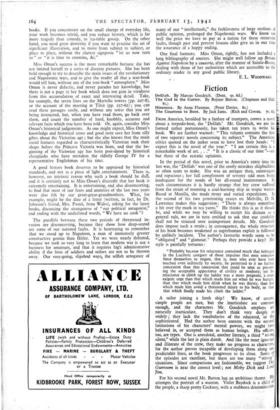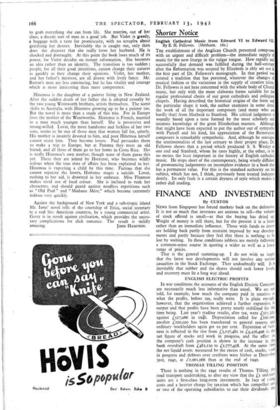Fiction
Delilah. By Marcus Goodrich. (Dent. 9s. 6d.) The God in the Gutter. By Reyner Barton. (Chapman and Hall.
8s.) The Countess to Boot. By Jack lams. (Rich and Cowan. 7s. 6d.
FROM America, heralded by a fanfare of trumpets, comes a novel about a torpedo-boat, the ' Delilah.' Mr. Goodrich, we are in- formed rather portentously, has taken ten years to write his book. We are further warned " This volume contains the first of two separate novels concerning its subject." The American critics quoted on the jacket seem to have lost their heads : " I expect this is the novel of the year." " I am certain this is a remarkable work of art. . . ." " It is a classic of our time "—are but three of the ecstatic opinions.
In the period of this novel, prior to America's entry into the last war, the ' Delilah ' was one of the costly mistakes shipbuilders so often seem to make. She was an antique then, extravagant and rapacious ; her full complement of seventy odd men being inadequate for the needs of her all-round maintenance. In such circumstances it is hardly strange that her crew 'suffered from the strain of manning a coal-burning ship in tropic waters. Based at Manilla, she made many and varied expeditions. In the second of his two penetrating essays on Melville, D. H. Lawrence makes this suggestion : " There is always something a bit over the mark in sea yarns." He thinks this is as it should be, and while we may be willing to accept his dictum as a general rule, we, are in turn entitled to ask that our credulity shall not be strained over unimportant details. Mr. Goodrich does impose such a strain ; in consequence, the whole structure of his book becomes weakened as superhuman exploit is followed by unlikely incident. The author's favourite words seem to be " obligated " and " glamour:' Perhaps they provide a key? His style is painfully tortuous : " Probably because his reluctance contained much that belonged in the Luciferic category of those impulses that men somehow force themselves to negate, that is, men who ever have been touched even indirectly by society, he permitted to it no further concession than that concession that could be seen as present- ing the acceptable appearance of civility or modesty; yet his reluctance to climb up- the ladder was a more poignant, a more exigent urge than that which made him eat when he was hungry, than that which made him drink when he was thirsty, than that which made him avoid a threatened injury to his body, or than that which finally made his climb the ladder."
A sailor joining a fresh ship ! We know, of course, simple people are rare, but the inarticulate are common enough, and the characters Mr. Goodrich employs are naturally inarticulate. They don't think very deeply or widely ; they lack the vocabularies of the educated, or the sophisticated. Had the author been content with the natural limitations of his characters' mental powers, we might have believed in, or accepted them as human beings. His officers, too, are types. One is anecdotal, another literary, a third " strong silent," while the last is plain dumb. And like the most ignorant and illiterate of the crew, they make no progress as characters, for the author proves incapable of developing them along tin' predictable lines, as the book progresses to its close. Some of the episodes are excellent, but there are too many " strong" situations. Since comparisons are fashionable, -we suggest The Gunroom is near the correct level ; not Moby Dick and Lord iins• For his second novel Mr. Barton has an ambitious theme. He, attempts the portrait of a wanton. Violet Baydock is a child 01 the people, a sharp pretty Cockney, with a stubborn determination to grab everything she can from life. She marries, out of her class, a decent sort of man in a good job. But Violet is greedy, a baggage with a taste for promiscuity, with no scruples about gratifying her desires. Inevitably she is caught out, only then does she discover that she really loves her husband. He is shocked and distraught. At this point the book loses much of its power, for Violet decides on instant reformation. She becomes an idea rather than an identity. The transition is too sudden ; people, for all their good intentions, cannot change their natures as quickly as they change their opinions. Violet, her mother, and her father's mistress, are all drawn with lively fancy. Mr. Barton's men are less convincing, but he has vitality and courage which is more interesting than mere competence.
Hinemoa is the daughter of a painter living in New Zealand. After the sudden death of her father she is adopted casually by the two young Wentworth brothers, artists themselves. The scene shifts to Australia, with Hinemoa growing up to be a painter too. But the novel is more than a study of this trio. For in Europe lives the mother of the Wentworths. Hortense is French, married to a man much younger than herself. She is possessive and strong-willed. Lovat, the more handsome and feckless of her two sons, seems to be one of those men that women fall for, utterly. His mother is insanely devoted to him, and poor Hinemoa herself cannot resist him. They become lovers. Paul persuades them to make a trip to Europe, but at Panama they meet an old friend, and all three of them go to her home in Costa Rica. She is really Hinemoa's own mother, though none of them guess this yet. There they are joined by Hortense, who becomes wildly jealous when the true state of affairs has been explained to her. Hinemoa is expecting a child by this time. Furious that she cannot separate the lovers, Hortense stages a suicide. Lovat, rushing to her aid, is drowned in her embrace. Miss Flaxman makes vivid use of local colour. She is inclined to rush her characters, and should guard against needless repetitions such as " Old Paul " and " Madame Mere," which become extremely tedious very quickly.
Against the background of New York and a sub-tropic island Mr. lams' novel tells of the courtship of Erica, social secretary to a real live American countess, by a young commercial artist. Gerry is in revolt against civilisation, which provides the neces- sary complications for slick romance. The result is mildly



























 Previous page
Previous page